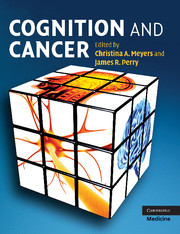Book contents
- Frontmatter
- Contents
- List of contributors
- Preface
- Section 1 Cognition and the brain: measurement, tools, and interpretation
- Section 2 Effects of cancer and cancer treatment on cognition
- 7 Biological bases of radiation injury to the brain
- 8 Cognitive dysfunction related to chemotherapy and biological response modifiers
- 9 Effect of hormones and hormonal treatment on cognition
- 10 Low-grade gliomas
- 11 High-grade gliomas
- 12 Brain metastases
- 13 Primary central nervous system lymphoma
- 14 Childhood brain tumors
- 15 Neurofibromatosis
- 16 Hematological malignancies
- 17 Paraneoplastic disorders
- 18 Symptomatic therapies and supportive care issues
- 19 Animal models and cancer-related symptoms
- Section 3 Interventions and implications for clinical trials
- Index
- Plate section
- References
9 - Effect of hormones and hormonal treatment on cognition
Published online by Cambridge University Press: 13 August 2009
- Frontmatter
- Contents
- List of contributors
- Preface
- Section 1 Cognition and the brain: measurement, tools, and interpretation
- Section 2 Effects of cancer and cancer treatment on cognition
- 7 Biological bases of radiation injury to the brain
- 8 Cognitive dysfunction related to chemotherapy and biological response modifiers
- 9 Effect of hormones and hormonal treatment on cognition
- 10 Low-grade gliomas
- 11 High-grade gliomas
- 12 Brain metastases
- 13 Primary central nervous system lymphoma
- 14 Childhood brain tumors
- 15 Neurofibromatosis
- 16 Hematological malignancies
- 17 Paraneoplastic disorders
- 18 Symptomatic therapies and supportive care issues
- 19 Animal models and cancer-related symptoms
- Section 3 Interventions and implications for clinical trials
- Index
- Plate section
- References
Summary
Introduction
This chapter will address the possible influences of hormonal therapy on cognitive functioning. Hormonal therapy is an important treatment option for, among others, breast and prostate cancer. While there is increasing evidence that chemotherapy induces cognitive dysfunction in a subgroup of patients (Tannock et al., 2004), the effects of hormonal therapy on cognitive functioning have not been investigated thoroughly. Actually, it is conceivable that hormonal therapy also influences cognitive performance. After all, hormonal therapies interfere with serum levels of reproductive hormones (particularly estrogens and androgens) or with hormonal actions. There are indications that reproductive hormones are important in cognitive functioning (Bender et al., 2001). The mechanisms of action of reproductive hormones on brain structures are not entirely understood. One of the possibilities is that these hormones act through estrogen and androgen receptors that are present in those brain structures important for cognitive function, for example the hippocampi and the cerebral cortex (Norbury et al., 2003). Furthermore, it has been suggested that reproductive hormones have a beneficial effect on neurotransmitters that are involved in cognitive processes (Cholerton et al., 2002; Norbury et al., 2003).
Hormonal therapy is increasingly used for breast and prostate cancer, often for long periods and by elderly patients. Because intact cognitive functioning is essential for independent living and activities of daily life, elucidation of the possible effects of the various hormonal agents and treatment regimens is becoming increasingly important.
- Type
- Chapter
- Information
- Cognition and Cancer , pp. 115 - 141Publisher: Cambridge University PressPrint publication year: 2008

